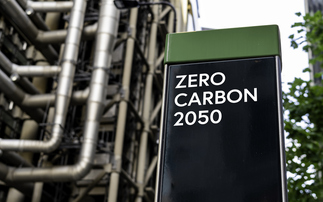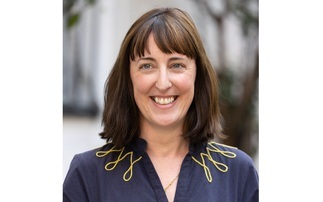Carlsberg's sustainability director on the sales skills all green professionals need
Simon Boas Hoffmeyer is sustainability director at Carlsberg. Earlier this year he launched, Together Towards Zero, a major new sustainability strategy that will see the brewer target zero carbon emissions at its breweries worldwide by 2030.
Where were you in 2007?
In 2007 I was studying for an MBA in China. I was comparing corporate social responsibility (CSR) in China versus Europe, and looking at how to ensure a knowledge transfer was happening from Europe to China. So that was where I started off with my more practical experience within sustainability, but at the same time I was actually working for Carlsberg in their communications and company branding department, helping define the first Carlsberg Group CSR strategy.
So going forward to 2017, how has the approach evolved?
In 2007 we started getting our house in order, aligning our policies by ensuring that in the company we had minimum standards that were adhered to, and also ensuring really good structured reporting and communication of data from all of our subsidiaries across the world.
So in those first years we were really focused on getting the CSR framework up and running, including governance in the business, to ensure CSR was taken into account in all the business decisions. And then of course, publish annual progress to stakeholders.
After that we moved into a more topic-specific era, where we focused on partnerships within packaging, using the cradle-to-cradle design framework, and working with suppliers through the Carlsberg community.
A lot of our impact is outside our direct sphere of influence. Therefore we really looked beyond our own fences into the supply chain.
Now I think with our new programme, Together Towards Zero, we have really combined the best of all the things we have learned in the past, and started looking at these long-term ambitions and really connect that with medium and short-term achievements in order to keep up the momentum.
What is the most important lesson you have learned over the past 10 years?
You need to integrate sustainability into the business - a lot of people are talking about it, but really doing it involves engaging your internal colleagues in all the different parts of the business. That is definitely something that we have become much better at over the years.
In 2016 we did training sessions with more than 7,000 colleagues on our ethical behaviour, in our work with society and sustainability, and how we interact with each other internally. So we did real on-the-ground training where we got so much great feedback from colleagues, and that impacted on the Together Towards Zero strategy. It really ensured a much better internal alignment and actual integration than we have seen in the past years.
The difference was really being able to get from management level and from senior level to real employee level. Mobilising and engaging employees, even where they might not be a direct impact, that is really valuable, and that provides a lot of input and excitement into projects that wouldn't appear otherwise.
Where do you expect to be in 2027?
Now that we have set out 2030 targets I would expect I will be part of making sure that is brought to life - but of course you never know what will happen! I do think Together Towards Zero is an incredibly exciting journey over the next 13 years, and I would hope to see it to the end in order to ensure we achieve our targets and we deliver the business and societal value that we set forward.
What is your vision for the green economy in 10 years' time?
2027 is definitely past the point where we should have seen gigantic strides to achieving the Sustainable Development Goals (SDGs) and the Paris Agreement. Those two activities, they are to me two of the most prominent current activities and visions for the future that the world has set forth.
So what I would expect in 2027 is that we have actually moved beyond the Paris Agreement, and to some extent the SDGs, and that we have started discussing planetary boundaries to a much larger extent.
And we will also in 2027 hopefully have seen the rate of innovation go way beyond our expectations, meaning we will have technologies and abilities to live more sustainable lives as consumers and companies that we do not see in 2017.
What will be the biggest changes from today's world?
The speed at which we will be able to disseminate new technology I think will be much bigger.
When you look at solar, when you look at wind, when you look at these types of renewable solutions, if they were invented in 2025 I think you would see it reaching scale much faster.
So for me, that is likely to be the biggest change - our ability to quickly scale solutions that can make a real impact.
Which three sustainability challenges will be top of the agenda in 2027?
The discussion around the planetary boundaries and all the different aspects of that I think will be crucial. For example, arable land for food production - I think top soil quality and nutrients in our soils will be one of the key topics, not only in 2027 but probably earlier.
I also think water will be a key issue… ensuring access and high quality of water.
And then there is the rare earths and metals in some of the electronics we use - that will increase in prominence over the coming years.
Will the world be on course for two degrees in 2027?
I think we will get there. For me, the tipping point was Paris. Regardless of what some world leaders are saying I believe that we will reach it, and I also have faith in us reaching the more ambitious target of 1.5 degrees.
The reasons are many. I see commitment from businesses through for example the RE100, the We Mean Business Coalition, and through the opportunity-side of sustainability. That has really made me an optimist. I also see the world uniting in general on, for example, the SDGs - just the fact the SDGs were approved in the UN General Assembly unanimously is a very strong signal about us having a global vocabulary for sustainability and sustainable development.
I'm not saying that there won't be difficult times ahead or actions carried out by world leaders or other companies that goes against this, but in general I am an optimist and have felt like that ever since I stood in Paris and witnessed the agreement being approved.
If you could invest in one clean technology through to 2027 which would it be and why?
The Carlsberg Foundation has just invested $80m in impact investments in sustainable agriculture, water technologies and low-carbon fuel alternatives. So they singled out these three investment areas. If I had that type of money I would have done the same.
What advice would you give to a sustainability professional starting their job today?
Remember that to be able to have an impact requires you as a sustainability professional to equally be a salesperson internally, a strong project manager, and have an insatiable interest in how the business works. Those are three key things it takes to be a successful sustainability professional, because that's really the ingredients for achieving things in a business.
This interview is part of a series, published in association with Greenhouse PR, to mark BusinessGreen's 10th anniversary. The full series, including interviews with Christiana Figueres, Lord Stuart Rose, and Lord Stern, is available here.









